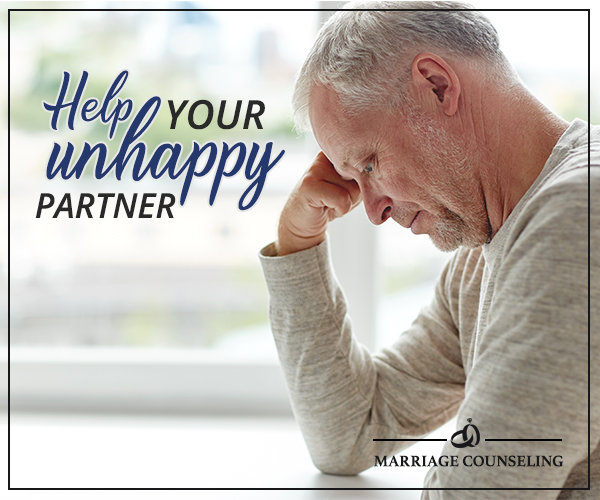Your partner has changed, they’re acting upset, unhappy or simply down or depressed. How can you help your unhappy partner?
When people we love are hurting it’s natural to want to help, to fix things even. Sometimes that’s not possible, so how do you help your unhappy partner, and how do you know where to draw the line on interfering or when it’s appropriate to stay out of the way and let them work things out on their own?
Here are some guidelines to help you:
Talk about everything and prepare for this scenario. Have conversations with your partner so that you understand how to listen to your partner. They need to know that it’s okay for them to ask for what they need. Even if they don’t ask you should reach out to them. Sometimes the answer is “don’t help”. It may be something they need to work out on their own. You have to be okay with that and simply step back and stay out of it.
Helping your unhappy partner may look different and unique to every couple. If your partner is your best friend, sometimes your mere presence is enough to show support and help them figure things out.
Sometimes helping your unhappy partner means that you ask them what you can do and follow their direction. Maybe you are only a sounding board for them to vent and that’s okay too. A shoulder to cry on or a listening ear is often exactly what is needed.
Before you jump in to save the day makes sure you’re being sensitive to what your partner needs. It’s natural to want to fix things, to make them better and to be your partner’s hero. Sometimes your partner needs to be their own hero and work out their issues without assistance. Maybe a word of advice is asked for, or maybe your partner just needs you to give them extra loving support while they go through something difficult.
One of the most loving things you can do is to make yourself available to help your unhappy partner when they are having problems, even if they never ask you to help. Simply knowing you are there is a great comfort and gives them confidence that they’re not alone in working out their issues.
Be aware of warning signs that indicate depression, anxiety or other mental health issues, and if there are red flags, be sure to act on those with your partner’s consent of course. If your partner is at risk for self-harm don’t wait, contact a professional to help. Your partner may be in crisis and you can’t overlook that.
Otherwise, take your cues from them and act accordingly. Be your partner’s best friend and help them out as you are needed.







